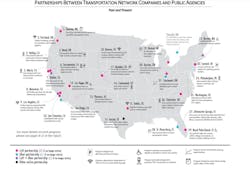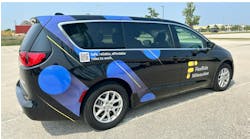A new study released by DePaul University’s Chaddick Institute concludes that partnerships between government agencies and TNCs are an increasingly popular way to enhance regional mobility. The study, Partners in Transit: A Review of Partnerships between Transportation Network Companies and Public Agencies explores 29 partnerships designed to enable transit operators and TNCs (predominately Lyft and Uber) to solve mobility problems collaboratively that each sector would have difficulty solving alone.
This strategy has its risks, but is backed by research showing ridesharing and transit can complement each other in many situations, notes professor Joe Schwieterman, a co-author of the study. A properly designed program, the experience shows, can be cost effective when compared to the cost of buying buses and paying for labor, fuel and maintenance on lightly used routes. Nevertheless, both political and operational barriers exist: “Partnerships can be awkward due to heightened competition between ridesharing and transit, especially where the expansion of new lower-priced services such as Lyft Line and UberPool is taking place,” Schwieterman concludes.
The partnerships tend to differ widely between metropolitan regions. Dublin, California, offers across-the-board 50 percent discounts of up to $5 on all Uber and Lyft trips within its boundaries, including those shuttling to its Bay Area Rapid Transit station. Monrovia, California’s partnership goes one step further, subsidizing Lyft rides to the point that all trips starting and ending within its boundaries cost just $0.50. Since the program’s introduction in March, more than 53,000 trips have been taken at this ultra-low rate.
Other partnerships focus on particular routes or areas. Programs in Dayton, Ohio, (administered by its Regional Transportation Authority), as well as those in San Clemente, California, and Marin County, California, are good examples of this, limiting rideshare discounts to certain designated transit stops. Across the Canadian border, Innsifil, Ontario — reportedly Uber’s first program in that country — offers $5 discounts for most trips within its boundaries.
Charlotte, North Carolina, improves access to its Lynx light-rail system by offering discounted Lyft rides to/from a pair of stations that start or end within certain geographic areas. Austin, Texas’s program involves RideAustin, a homegrown TNC; riders receive free trips within its Exposition Area, which has many technology jobs, as well as those trips to/from nearby Capital Metro bus stops.
Even so, as co-author Mallory Livingston notes, “Public officials are feeling pressure to think outside the box to fill gaps in their transit networks and gain experience working with new technologies. Many programs have a distinctly home-grown feel. Almost all take into account local problem spots, such as “transit deserts” and recent service cutbacks”.
Altogether, the study shows, 11 of the 50 largest transit agencies in the United States have partnerships strategies involving TNCs. If more major players develop programs, there will likely be “strings attached” for users due to the obvious problem that a poorly designed program could cannibalize bus and train ridership — and worsen roadway congestion. Agencies in Boston and Las Vegas, for example, have created programs limited primarily to paratransit-eligible users to test the waters while managing risk.
Presently, there is a great deal of interest in incorporating payment for both rideshares and transit — and connections between the two — on a single app. The rollout of this appears imminent—once sensitive issues such as protecting private information and technological hurdles can be crossed.
DePaul’s Chaddick Institute is hosting a free webinar featuring officials who manage programs around the country on Tuesday, August 28, from Noon – 1 pm CDT. To learn more, receive a copy of Partners in Transit, or speak with the authors, email [email protected] or call 312.362.5732.





